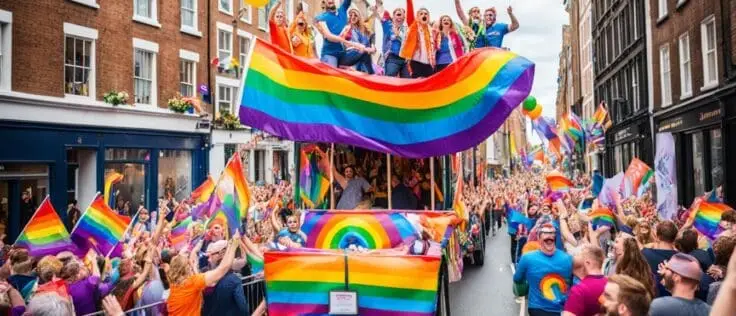Have you ever thought about why Pride Month is so important, especially today?
Pride Month UK is a time to think, celebrate, and come together. It highlights the LGBTQ+ community’s diverse and vibrant culture. Today, as we face COVID-19 challenges, we see how vital community support is. The scale of mental health issues and loneliness has grown.
A report by Stonewall shows worrying figures. 52% of LGBT folks have felt depressed. And many have thought about suicide. This shows why we need to stand together more than ever.
Events like NHS Virtual Pride show our collective push for inclusiveness. It brings together over 250,000 NHS staff. Such efforts are vital. They help everyone feel accepted in healthcare. Sadly, there’s a gap in experiences at work for LGB and heterosexual NHS staff.
Pride in Practice is improving care for LGBT patients. Over 2 million people are now getting better healthcare. These steps forward are crucial for creating a safer, more caring world.
Pride brings the LGBTQ+ community and allies together. It fuels our fight for equal rights. The UK has seen progress, but challenges remain. We must keep pushing against conversion therapy and rising hate crimes.
Pride Month isn’t just a celebration. It’s a powerful support for those living openly. It reminds us all that the struggle for equality and acceptance involves everyone. Now, more than ever, this unity is essential.
The History of Pride Month
Pride Month starts in June to remember the 1969 Stonewall Riots. These protests kick-started the gay rights movement across the globe. The Stonewall Riots are a key event in LGBTQ+ history, symbolising a shift towards seeking true equality.
The first UK gay pride rally was in London, 1970, right after the Stonewall Riots. It was the beginning of the Pride movement in the UK. Since then, Pride Month celebrates the bravery of early activists and the continued fight for LGBTQ+ rights.
Over the years, the UK has seen progress like the Civil Partnership Act (2004) and the Same-Sex Marriage Act (2014). These laws are big steps forward since Pride began. They also show the ongoing work needed to fight injustice in the LGBTQ+ community.
London is now a key place for Pride, with one of the biggest parades globally each year. The 2024 Pride Parade will go from Hyde Park Corner to Whitehall Place. It’s set to be a remarkable event, highlighting LGBTQ+ issues.
Pride Month is also the anniversary of the Stonewall Riots. This stresses how these historic events are linked to today’s celebrations. Remembering Pride’s roots and the battle for LGBTQ+ rights ensures we keep moving towards equality and visibility.
Importance of LGBTQ+ Awareness and Education
Raising LGBTQ+ awareness and promoting education are key to acceptance and understanding. Stark statistics show the challenges faced by the LGBTQ+ community. For example, hate crimes against LGBTQIA+ people in the UK more than doubled from 2016/17 to 2020/21. This increase shows why we need more LGBTQ+ education to fight discrimination.
It’s crucial to address health inequalities within the LGBTQ+ community. According to Stonewall’s 2018 report, 52% of LGBT people suffered from depression. Also, 46% of trans people and 31% of non-trans LGB people have thought about suicide. These numbers show the need for better mental health support and healthcare services.
Pride events help support and unite the community. They offer young LGBTQIA+ people a chance to meet and feel part of the community. This sense of belonging fosters self-acceptance and prompts more conversations about LGBTQ+ history and issues.
Legislation has progressed, like ending Section 28 and allowing same-sex marriage. Yet, challenges remain, such as the exclusion of trans people from the conversion therapy ban and long waits at gender clinics. LGBTQIA+ individuals also face discrimination in work and healthcare. Continued education on LGBTQ+ issues is vital to overcome these problems.
Pride events are more than celebrations. They are opportunities to show support and share resources. Charities and groups offer their services, creating a welcoming environment. This collaborative approach strengthens the community, making everyone feel seen and important.
General talks and local Pride events increase societal acceptance. They might encourage people to come out to friends and family. By having these conversations and participating in events, we improve understanding and inclusiveness. This highlights the crucial role of LGBTQ+ awareness and education in society.
Pride Month UK
Pride Month in the UK is a crucial time for celebrating LGBTQ+ rights UK and visibility. It’s a period when British communities come together. They celebrate the LGBTQ+ community’s diversity and resilience. The first Pride parade in June 1970 started it all, honouring the Stonewall Inn uprising. Then came the first UK Gay Pride Rally on July 1, 1972.
Actions like repealing Section 28 and allowing same-sex marriage show progress towards equality. Still, challenges remain. For example, trans people still face issues, such as being excluded from conversion therapy bans. Long waits at gender clinics also highlight the need for continued support and reforms.

Mental health support is vital during Pride Month. Research reveals that having allies greatly reduces suicidal thoughts among LGBTQ+ folks. It’s essential to create inclusive environments. Pride events offer safe spaces to openly celebrate identities, also fostering a sense of belonging.
Inclusivity also involves organisations. They should offer LGBTQ+ training and resources during Pride Month. Such efforts can help create a supportive workplace environment. It’s especially important for trans and non-binary people, who often face discrimination.
After Pride Month’s celebrations, supporting LGBTQ+ inclusion must continue. Although there has been progress, the journey isn’t over. We need ongoing advocacy and support to protect LGBTQ+ rights and well-being in the UK.
Diverse Celebrations Across the UK
June is known as Pride Month, celebrating LGBTQ+ communities around the world. The UK sees a range of colourful events during this month. These events honour the many identities within the LGBTQ+ community and encourage unity and conversation.
Pride in London happens on June 29. Other important events include London Trans+ Pride on July 27 and UK Black Pride on August 11. These celebrations bring people together and highlight the importance of inclusivity and cross-cultural support.
These LGBTQ+ events go beyond just marches. They feature cultural activities like tours, sports, and parties. For example, universities host Pride celebrations with discussions on LGBTQI+ topics, fostering a sense of community.
London Pride is a major event, with a parade ending at Trafalgar Square. Oxford Pride will celebrate its 21st anniversary in 2024 with live music across three stages. Edinburgh Pride, the longest-standing event in Scotland, features a parade that ends at the Scottish Parliament.
Cardiff Pride is a two-day event with a warm and inviting atmosphere. Brighton and Hove Pride is among the UK’s biggest, with a parade, parties, and a concert in Preston Park. These events showcase the diversity of UK Pride celebrations.
Manchester Pride takes place in late August, featuring LGBTQ+ artists and global stars. UK Black Pride celebrates black and LGBTQ+ identities with performances and community activities on August 11. Additional events in June 2024, like Bodmin and Cambridge Pride, support the LGBTQ+ community through volunteer work and donations.
Creating Safe Spaces for the LGBTQ+ Community
Safe spaces for the LGBTQ+ community are vital throughout the year, especially during Pride Month. These spaces, which can be social, digital, or physical, let LGBTQ+ people be themselves freely and find support. Allies and organisations are crucial in making LGBTQ+ people feel included, providing networks of support and fighting for equality.
LGBTQ+ groups like Bike for Good show why queer spaces are essential. They believe safe spaces will be important until they’re not needed anymore. Rumpus Room agrees, focusing on making spaces welcoming for all LGBTQI+ people. They aim to boost confidence and help build connections.
The Feminist Exchange Network believes safe spaces are key to gender equality. Organisations work hard to make these places inclusive. For example, Bike for Good uses gender-neutral language and trains staff on diversity. Rumpus Room includes a queer-focused library and uses language that everyone feels comfortable with.
Showing signs that a place is LGBTQ+ friendly helps everyone feel welcome. Having rules for safety issues is also important. It’s vital for allies to stay involved, during Pride Month and after. By working together and learning more, we can create a fairer society.
Centrepoint is working on creating LGBTQ+ only spaces. They’re putting up LGBTQ+ posters in shared spaces and suggest gender-neutral bathrooms. Every staff member learns about LGBTQ+ issues. They also consider the psychological needs of LGBTQ+ youth.
It’s important to make sure LGBTQ+ inclusion is accessible to everyone. Continuing to support and advocate is key to making long-lasting safe spaces. These efforts are the foundation of an equal society.
Impact on Mental Health
The LGBTQ+ community faces a lot of mental health challenges. They are more likely to suffer from depression, anxiety, and thoughts of suicide than straight people. This is because they often face discrimination, have fewer support services, and are left out by society.
It’s worrying to know LGBTQIA+ folk are four times as likely to think about suicide. About one in six transgender people and nearly half of those who are non-binary struggle with long-term mental issues. These numbers show how critical it is to help improve their mental health.

It’s key to support their psychological health. Vivienne Cass found six stages of LGBTQ+ identity development: confusion, comparison, tolerance, acceptance, pride, and synthesis. Getting through these stages can really help. But, to reach the stages of pride and synthesis, strong support networks are needed.
LGBTQ+ people often feel isolated because of social stigma and rejection from family. Indeed, 31% of LGBTQIA+ workers have faced job-related discrimination, with 25% missing out on opportunities because they’re out. Discrimination at work can hurt their mental health.
Also, in 67 places around the world, being in a same-sex relationship is illegal. In 11 of these, it could mean death. Laws like these cause a lot of stress and harm their mental health.
Support services can help lessen these negative effects. Taking part in Pride events can boost happiness and confidence. Access to mental health care and support groups is crucial.
Groups like Mind, Stonewall, and Gendered Intelligence offer important help. Allies and employers can also make a big difference by creating a welcoming atmosphere. This can improve the mental well-being of LGBTQ+ people by encouraging openness and providing support.
Ongoing Struggles and the Need for Continued Advocacy
Nearly fifty years after London’s first Pride march in 1972, UK’s LGBTQ+ community still faces significant challenges. Despite achievements like the decriminalisation of homosexuality in 1967, and legalising same-sex marriage in 2013, issues remain. These remind us why we must keep fighting for rights and equality.
Even with more LGBTQ+ people in the media, hate crimes, especially against transgender folk, are rising. This shows the sad truth of ongoing discrimination. Trans people also struggle with healthcare delays and legal issues in changing their gender. Though the law allows it, the process is tough.
The UK sees growing corporate support for LGBTQ+ rights, aiding Pride financially and boosting inclusion. Such backing is vital for equality efforts. Yet, we need stronger laws, especially for trans rights, where the UK is behind. A key law to make gender change easier was even blocked.
The battle for LGBTQ+ rights continues, pressing us to advocate more. Pride Month, beyond its celebration, highlights current issues and calls for action. We must fight legal injustices, hate crimes, and seek better healthcare for all LGBTQ+ folk. True equality is still ahead, demanding our persistent advocacy for a fully inclusive society.
Conclusion
As Pride Month ends, we see a strong testament to the LGBTQ+ community’s resilience, diversity, and progress. The first UK Pride event in 1972 saw 2,000 people gather. Now, over a million join the celebrations, showing how much unity and progress we’ve achieved.
Despite the UK falling in the Rainbow Map rankings and a rise in anti-LGBTQ+ feelings, Pride Month stays strong. It’s a bold statement of unity and a steadfast call for equality. The introduction of LGBTQIA+ studies in UK schools and more LGBTQIA+ characters on TV are big steps forward.
These achievements bring hope amid challenges like Scotland’s blocked Gender Recognition Bill and high transphobia in health services. It shows our enduring fight for equality and respect.
Worldwide, acceptance for the LGBTQ+ community varies greatly. Over 80% of hate crimes against LGBTQ+ individuals are not reported.
Yet, there’s progress, like India decriminalising homosexuality in 2018. And in 2022, countries like Switzerland, Chile, and Slovenia legalised same-sex marriage.
Pride Month is both a joyous celebration and a serious call to action.
It embodies the crucial balance needed for continual progress. As we mark 50 years of Pride, we reflect on our journey and ongoing struggles. By educating, advocating, and supporting each other, we keep the spirit of Pride alive. It drives us towards a more inclusive and equal world every day.
Sources
Pride Month is celebrated in the UK every June. It marks the struggle and wins of the LGBTQ+ community over decades. Sources like the first UK gay pride rally in London and the Same-Sex Couples Marriage Act of 2014 are key to understanding this journey. They show how far the community has come towards equality. Reliable stories about Section 28’s effect on schools in the 1980s and 1990s show the challenges LGBTQ+ people faced and still face.
There are many ways to learn more about LGBTQ+ lives and experiences. The Proud Trust offers youth mentoring. Netflix has a wide range of LGBTQ+ films. Events from BBC Sport and various Pride Month activities celebrate LGBTQ+ culture and work. Lists of classic LGBT+ films on Amazon Prime and recommended podcasts add to this rich culture.
Schools like the University of Hertfordshire focus on career growth through LinkedIn Learning. This highlights how important credible sources are for creating a welcoming space. Public events by Hertfordshire Constabulary and City of London Police talk about the AIDS epidemic’s legacy. They stress the need for accurate info in the fight for rights. Keeping up with these resources helps us understand LGBTQ+ rights and history better.






